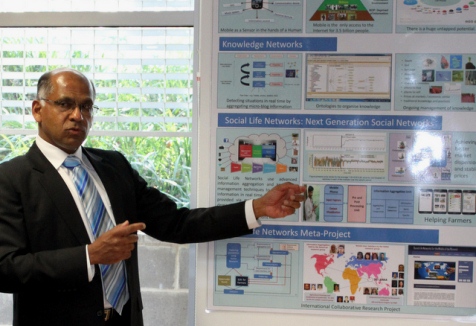Next-generation social networks for developing countries

Social networking has been embraced by businesses in developed nations across the globe as a way of connecting with customers, staff and stakeholders. Now, Professor Athula Ginige from the School of Computing, Engineering and Mathematics has been turning his talents towards how farmers in developing countries can tap into social networking to make better business decisions.
Athula has been working on an international collaborative project involving researchers from Australia, USA, Italy and Sri Lanka called Social Life Networks (SLN). SLN is an internet-based system accessible on mobile phones for people working in developing countries to support their livelihood activities.
In their first project, the researchers are focusing on farmers. "SLN uses advanced information aggregation and knowledge-management techniques to derive information such as market prices and production level predications in real time from the information that users provide to the system via their mobile phones," explains Athula. "Users are provided with easy-to-use interfaces on their mobile phones to access this aggregated information as well as other information they need to make decisions related to their livelihood, including farming techniques, pest control methods, livestock diseases and vaccinations."
The first SLN is being developed for farmers in Sri Lanka. Recently, the over-production of tomatoes and vegetables such as leeks has been a recurring problem that leads to financial difficulties. "To reduce this over-production, farmers need to know how much of a particular crop has already been planted by others at the time the farmer is deciding what crop to grow," says Athula. "The challenge is to provide this information at the right time, which is the initial focus of this collaborative research project." This can be achieved using an online social network that aggregates information provided by farmers on what they are growing.
Through the SLN project, Athula and his fellow researchers have developed methodologies to organise a large amount of agriculture information extracted from government websites, agriculture department leaflets and books to deliver the right information at the right time to farmers via their mobile phones.
"By leveraging the enormous reach of mobile phones equipped with myriad sensors, such as GPS and cameras, it's now possible to develop the next generation of social networks that not only connect people to people, but also have the capability of providing real-time, context-sensitive local information by aggregating information from a variety of sources including SMS messages, sensor data and data from public data sources such as meteorological data," says Athula.
Farmers throughout Sri Lanka will benefit from such information. "I would like to check whether I have chosen the correct quantities for my fertiliser and pesticide," says one Sri Lankan farmer. "Sometimes I get a bad crop because of the wrong quantities I have used. At the moment I just use my own knowledge."
With this in mind, SLNs could prove powerful forces for individual wellbeing and economic growth, especially for developing countries.
Mobile options:

